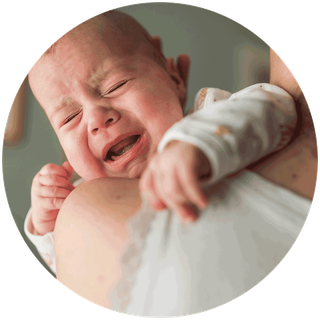Reflux and bottle feeding
When your baby brings up milk, or is sick during or after feeding, this is known as reflux.
Reflux is quite common and babies usually grow out of it by the age of 1.
Symptoms of reflux
Symptoms of reflux in babies include:
- bringing up milk or being sick during or shortly after feeding
- coughing or hiccupping when feeding
- being unsettled during feeding
- swallowing or gulping after burping or feeding
- crying and not settling
- not gaining weight as they're not keeping enough food down
Sometimes babies may have signs of reflux but will not bring up milk or be sick. This is known as silent reflux.
When to seek medical advice
If your baby has difficulty feeding or refuses to feed, keeps vomiting during or after feeding, talk to your pharmacist, GP, or health visitor.
Silent reflux
Silent reflux can be confusing as there are no obvious signs or clues (such as spitting up).
It's when the food travels back up the food pipe but is swallowed rather than spat out, so it's harder to identify.
Helping your baby with reflux
These tips may help reduce reflux for your baby:
Do
-
hold your baby upright during feeding and for as long as possible after feeding
-
burp (or wind) your baby regularly during feeds
-
make sure your baby sleeps flat on their back (they should not sleep on their side or front)
Don’t
-
do not raise the head of your baby's cot or Moses basket

Treatment for formula fed babies
If you're using formula, your GP or health visitor may advise you to use a thicker formula that's less likely to be brought up, or one that does not contain cows' milk if your baby is allergic to it.
If the thickening powder does not help, your GP may recommend medicines that stop your baby's tummy producing as much acid.
It may be helpful to keep a record of when your baby feeds, how often and how much your baby brings the food back up, and how often your baby cries or seems distressed. This will help your health visitor or GP decide if your baby needs treatment.
For more advice and information on when to see a GP or call 111, have a look at reflux in babies on the NHS website.
Causes of reflux
The muscle at the bottom of the food pipe acts as a kind of door into the stomach – so when food or milk travels down, the muscle opens allowing the food into the stomach.
However, while this muscle is still developing in the first year, it can open when it should not (usually when your baby's tummy is full). This allows some food and stomach acid to travel back up again.
Acid in the stomach is normal and a necessary part of the digestion process – it helps break down food.
In most babies, reflux is nothing to worry about as long as they are healthy and gaining weight as expected.
When to seek medical advice
If your baby has difficulty feeding or refuses to feed, regularly brings milk back up and seems uncomfortable after a feed, talk to your pharmacist, GP or health visitor.
They'll be able to give you practical advice on how to ease the symptoms and manage it. They may also need to rule out other causes (such as cow's milk allergy).
It might be helpful to keep a record of when your baby feeds, with details of how often and how much your baby brings the food back up, and how often your baby cries or seems distressed. This will help your health visitor or GP decide if your baby needs treatment.
Help and support
The NCT support line offers practical and emotional support with feeding your baby and general enquiries for parents: 0333 254 3146 (option 1)
